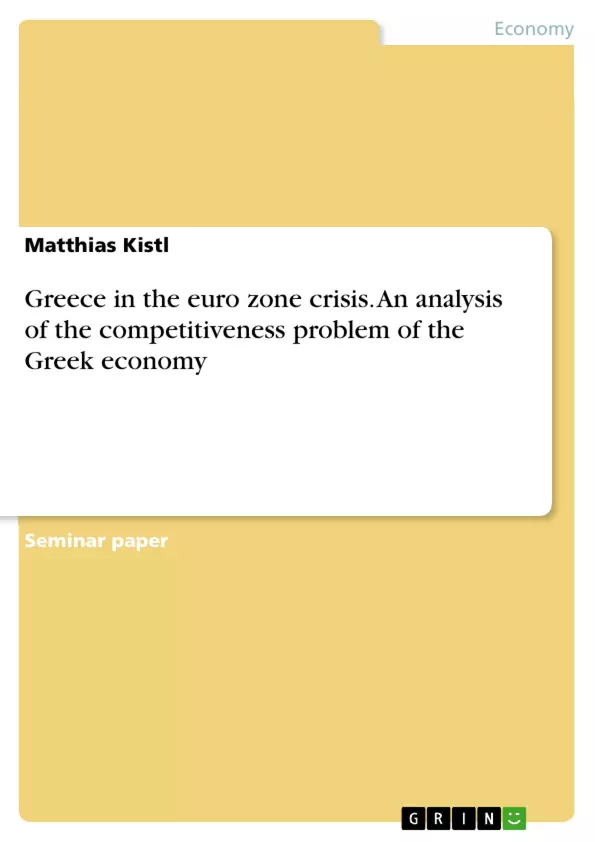The paper is divided into five parts: after the introduction, there is a theoretical chapter which deals with the general idea of competitiveness and scientific solutions for countries that get into a situation in which they have to regain competitiveness in order to improve their growth rates. The theoretical fundament of the paper will be followed by the third part which includes the empirical examination of the Greek competitiveness problem. Based on various data, it will be shown that Greece experienced a conspicuous loss of competitiveness compared to other euro zone member countries. Moreover, it will be become evident that Greece could skip necessary structural reforms due to declining interest rates and missing discipline within the euro zone. Afterwards, a short description of the counter policies and measures that were implemented or omitted will be given before analyzing the degree of achievement. One implication will be that Greece undertook great effort, but also could have done better in many respects. The fourth part will pick up the results of the empirical analysis and show that both the Troika and the Greek government acted imperfectly, but that structural reforms currently remain the best opportunity to reach a status of sufficient competitiveness again. The paper is rounded off by a conclusion.
Inhaltsverzeichnis (Table of Contents)
- Introduction
- Theoretical part
- The concept of competitiveness
- Solutions for competitiveness problems
- Empirical part
- Greece and its competitiveness problem: data and explanations
- Causes and comparison
- What happened in Greece to approach the problem?
- Discussion: what went wrong?
- Conclusion
- References
Zielsetzung und Themenschwerpunkte (Objectives and Key Themes)
This paper examines the competitiveness problem of the Greek economy in the context of the euro zone crisis. It aims to analyze the reasons behind Greece's loss of competitiveness, explore potential solutions based on economic theory, and evaluate the effectiveness of the implemented counter-measures. The paper focuses on the period following the 2007 financial crisis and its impact on Greece.
- The concept of national competitiveness and its relevance to economic growth
- The factors contributing to Greece's competitiveness problem, including macroeconomic imbalances, structural weaknesses, and policy choices
- The potential solutions to address competitiveness issues, focusing on both short-term and long-term strategies
- The effectiveness of the measures undertaken by Greece and the Troika in tackling the crisis
- The implications of Greece's experience for the euro zone and the role of structural reforms in achieving competitiveness
Zusammenfassung der Kapitel (Chapter Summaries)
- Introduction: This chapter provides an overview of the euro zone crisis and highlights the unique challenges faced by Greece. It introduces the key questions that the paper aims to answer, focusing on Greece's competitiveness problem, the evolution of the issue, and the effectiveness of the implemented policies.
- Theoretical part: This chapter explores the concept of national competitiveness and its key determinants. It examines various theoretical approaches to understanding competitiveness, including Michael E. Porter's Diamond approach, and discusses the importance of factors such as factor endowments, national demand, value chains, firm strategy, and productivity.
- Empirical part: This section analyzes Greece's competitiveness problem by examining relevant data and providing explanations. It focuses on factors like unit labor costs, exchange rates, trade balances, and investment in research and development. The chapter aims to demonstrate the extent of Greece's competitiveness deficit and how it developed over time.
Schlüsselwörter (Keywords)
This paper explores key themes such as competitiveness, euro zone crisis, Greece, macroeconomic imbalances, structural reforms, monetary policy, exchange rate, trade, investment, and productivity. The analysis highlights the importance of addressing these factors to achieve sustainable economic growth in the euro zone.
Frequently Asked Questions
What is the main focus of the analysis on Greece's economy?
The paper analyzes the competitiveness problem of the Greek economy within the Euro zone, examining causes for its loss and evaluating structural reforms.
How is national competitiveness defined in this context?
It refers to the ability of a country to achieve sustainable economic growth, often using frameworks like Porter’s Diamond approach to evaluate factor endowments and productivity.
What were the primary causes of Greece's loss of competitiveness?
Key factors included macroeconomic imbalances, rising unit labor costs, lack of structural reforms, and declining interest rates that reduced fiscal discipline.
What role did the "Troika" play in the Greek crisis?
The Troika implemented counter-policies and measures aimed at regaining competitiveness, though the paper notes that both the Troika and the Greek government acted imperfectly.
Why are structural reforms considered essential for Greece?
Economic theory suggests that structural reforms remain the best opportunity to address weaknesses in the value chain and reach a status of sufficient competitiveness.
Which economic indicators are used for the empirical examination?
The paper examines unit labor costs, exchange rates, trade balances, and investment in research and development (R&D).
- Arbeit zitieren
- Matthias Kistl (Autor:in), 2015, Greece in the euro zone crisis. An analysis of the competitiveness problem of the Greek economy, München, GRIN Verlag, https://www.grin.com/document/380916



